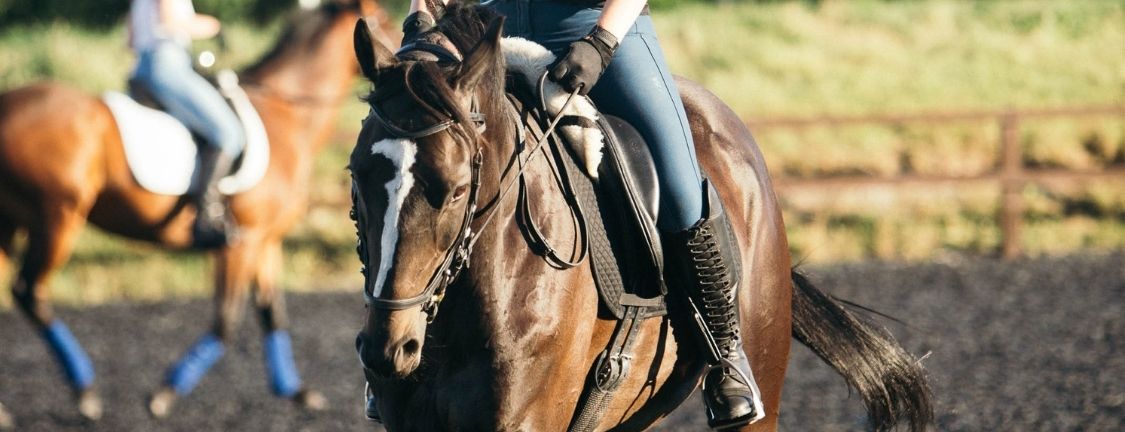
Hello everyone and welcome to this guest blog on ulcers in horses. First I'll give a little introduction to myself, my name is Leah Grange and I am an Equine Veterinary nurse based in Somerset with six years of experience working in a large Equine referral hospital. Harry Hall has asked me to write up my experience on Gastric ulcers in horses, following my experiences with horses in the veterinary practice and also with my horse, Colin. At the end of this blog I hope you understand more about ulcers in horses and get a good idea of what’s in involved managing ulcers from a vet nursing and an everyday horse owners view.
What are gastric ulcers in horses; the causes and symptoms explain
Gastric ulceration is generally caused by overproduction or excess stomach acid causing lesions and ulceration in the horse's stomach, this causes extreme discomfort. Ulcers in horses are graded from one to four with four being the most extreme ulceration. The main and most successful route of diagnosis is to have a Gastroscope procedure. In this procedure, the horse is starved for 12 - 18 hours beforehand, a camera is put down the oesophagus and into the stomach to look at the lining of the stomach including the pylorus which is the opening to the intestine from the stomach.
In my experience, ulcers in horses are usually secondary to another problem and the three main reasons are;
Orthopaedic pain, malnutrition and stress. With my horse Colin. malnutrition was definitely a contributing factor towards his condition as he came to me very unhealthy and undernourished.
Not every horse with ulcers loses weight
There I got it off my chest. I've had many conversations with people who explain behaviour changes and say \"it can’t be ulcers because he hasn’t lost any weight\" Colin actually put on +100kg before his gastric ulcers diagnosis.Some common symptoms that may indicate ulcers in horses may be;
- Weight loss
- Dullness in coat
- Angry or sour demeanour
- Colic
- Reluctant to move forward under saddle
- Bucking
- Sensitive to groom/touch abdomen more on right side
- Teeth grinding
Treatment for ulcers in horses
Whilst working in the veterinary practice I very much had an active role in diagnosing gastric ulcers in horses. I would be there to support the vet, I would look at the screen and see the ulceration and quickly learn the treatment patterns. I would happily dispense the medication and send owners on their way with lengthy instructions. On return to the hospital for a repeat scope, I would see owners absolutely desperate for a clear scope. In my opinion, one of the reasons for this is the treatment process. There is no escaping the fact that it's a long and tiring process.
The most common treatment for ulcers in horses would be oral Omeprazole commonly called Gastroguard, this is given one hour before food preferably on an empty stomach. When I was treating my horse for ulcers, it was during the winter, I gave this in the morning before Colin's breakfast and turnout. This quite often meant 4.30 am alarms to go give the medication and have enough time to do a normal morning routine before work. I was tired and just a couple of weeks in, craved the end of the treatment. There is an injectable option available which is one injection a week for as long as the treatment is needed. Of course, there are other medications and treatment plans that can be offered which you and your vet would decide which is best for your individual case. Pain can also be ruled out at this stage with a poor performance work up with your vet.
Managing a horse with gastric ulcers
Managing a horse with gastric ulcers or a horse prone to gastric ulcers can be a minefield. Some horses just don’t agree with grass and turnout so they would be harder to manage. So here are some ongoing management changes I have made for my horse following his ulcer treatment:
- As much turnout as possible
- Unlimited access to forage in the stable when stabled
- Feed chaff meal 15 - 30 minutes before riding and travelling
- Reducing as much stress as possible
- Feed a high fibre, low starch, low sugar diet
- Feed a gastric support supplement
- Support gastric health further when travelling, competing and staying away
Have fun, life with and after ulcers does not have to be hard work. Ask your vet to explain all the treatment and ongoing management options and you'll soon get to grips with it all.
If you want a shoulder to lean on during ulcer treatment you can find me on Instagram.
Leah and Colin xx
